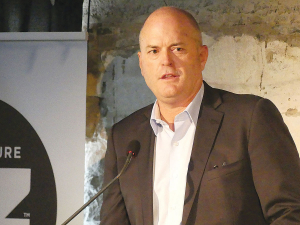MPI Hails Kiwifruit Boom as Horticulture Revenue Surges Past $9 Billion
Ministry for Primary Industries (MPI) Director General Ray Smith is giving a big shout-out to the horticulture sector, especially kiwifruit.
 Todd Muller says if National gets into government he will get rid of the ‘punitive model’ of engagement between government and farmers.
Todd Muller says if National gets into government he will get rid of the ‘punitive model’ of engagement between government and farmers.
National's agriculture spokesperson says his absolute priority, if his party gets into power, is to get rid of what he calls the 'punitive model' of engagement between government and farmers.
Todd Muller told Rural News he believes this model is as a result of a culture set by Environment Minister David Parker and Agriculture Minister Damien O'Connor. He says the farming sector faces a tsunami of regulations, most of which have come from the pen or mind of Parker, and that O'Connor hasn't been able to push back around the Cabinet table.
Muller also wants to see a reset of the relationship between the Ministry for Primary Industries (MPI) and the farming community. He has huge expectations of the Ministry for the Environment (MfE) as well - even if he didn't have responsibility for that department.
He wants MPI to build greater trust with farmers in actions and not just words. "I'll be asking MPI to sit down with farmers and with councils to say which of these regulations aren't working," Muller says.
"Certainly, we have heard examples of the winter grazing regs in Southland and SNA's (significant natural areas) that don't work from a sheep and beef perspective. We will then ensure that tweaks are made so the regulations work at a catchment and community level."
Muller also wants a reset on climate change, with much improved partnership arrangements between the Crown and the agriculture sector. He says there is no walking away from dealing with climate change issues and NZ is going to have to measure the impact of methane at farm level.
"Our customers and consumers are demanding of the whole of the NZ agriculture sector ongoing provenance that we are the best food producers in the world," he explains.
"Part of that is an expectation that as leader we look for solutions in that animal protein space - particularly in regard to methane - which don't exist at the moment. I also want to hear from the likes of Fonterra and Silver Fern Farms to give voice to those consumers' expectations so that farmers understand that this is not just some sort of government-driven process."
Muller believes where the sector landed with He Waka Eke Noa was a great starting point, but says the Government went completely off the trail and came back with something that was unworkable. "Understandbly, the ag sector told them in no uncertain terms that it was completely unworkable."
He says better systems and innovation are needed to resolve the challenges around climate, but, "Labour's approach is all around tax first and then find out how to measure second".
"I think they have got it all around the wrong way. I believe the principles that He Waka Eke Noa is built on is what we need. The aim must be to have a system which incentivises the right behaviour."
Pen Pushing Farmers
Another issue that Todd Muller wants to crack is the ‘crazy system’ whereby farmers are required to enter data from their farm separately into up to ten different databases.
He says in an era when there is a push for efficiency, and some smart technology around, what’s happening is completely ridiculous.
“It’s turning farmers into pen pushers and preventing them from working the land. It is an absolute bugger’s muddle that needs to be sorted out and quickly.”
Muller says he would put the acid on MPI to drive this, but not build the system and tell farmers what to do. He says any system has to be done in collaboration with the ag sector and not imposed on them.
“I will have a different set of priorities and expectations to those of Parker and O’Connor.”
Global trade has been thrown into another bout of uncertainty following the overnight ruling by US Supreme Court, striking down President Donald Trump's decision to impose additional tariffs on trading partners.
Controls on the movement of fruit and vegetables in the Auckland suburb of Mt Roskill have been lifted.
Fonterra farmer shareholders and unit holders are in line for another payment in April.
Farmers are being encouraged to take a closer look at the refrigerants running inside their on-farm systems, as international and domestic pressure continues to build on high global warming potential (GWP) 400-series refrigerants.
As expected, Fonterra has lifted its 2025-26 forecast farmgate milk price mid-point to $9.50/kgMS.
Bovonic says a return on investment study has found its automated mastitis detection technology, QuadSense, is delivering financial, labour, and animal-health benefits on New Zealand dairy farms worth an estimated $29,547 per season.

OPINION: Here w go: the election date is set for November 7 and the politicians are out of the gate…
OPINION: ECan data was released a few days ago showing Canterbury farmers have made “giant strides on environmental performance”.